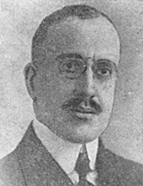

António Ferrão was a learned Portuguese historian and academic from the first half of the 20th century. However, little is known about his childhood, youth and personality. In his later years, brief notes reveal that he identified as an agnostic — "to us, agnostics by spiritual complexion" — and that António Cabreira remarked of him, at the Lisbon Academy of Sciences, that "he is an old, intemperate and upright republican" (António Ferrão, O Prof. Joaquim de Carvalho ..., 1960, pp. 13 and 29). Ferrão served as secretary of the Masonic Congress in 1924, suggesting he was likely a member of a Masonic lodge. That same year, Teófilo Braga, whom Ferrão referred to as his "late Master”, passed away. Ferrão considered himself both a student and disciple of Braga and claimed he was entrusted with prefacing Braga's correspondence that held significant scientific, political, moral and social value (Idem, Teófilo Braga e o Positivismo em Portugal ..., 1935, pp. 4 and 5).
As early as 1907, Ferrão published booklets on the parliamentary regime and trade unionism in various countries under the title Pequena Biblioteca Democrática. Fundador Heliodoro Salgado, sob a direcção de António Ferrão (2ª série) [Little Democratic Library. Founder Heliodoro Salgado, under the direction of António Ferrão (2nd series)]. He delivered numerous lectures and courses at the Universidade Livre [Free University] between 1912 and 1922, covering topics such as the history of religions, politics and diplomacy from 1815 to 1915 and the centenary of Brazil, among others. These lectures, published separately in the Trabalhos da Academia das Ciências de Portugal [Works of the Academy of Sciences of Portugal], demonstrate that some of his most extensive works originated from speeches given at these institutions (Dicionário Bibliográfico Português ..., t. XXII, 1923, pp. 266-269 and 535-536).
